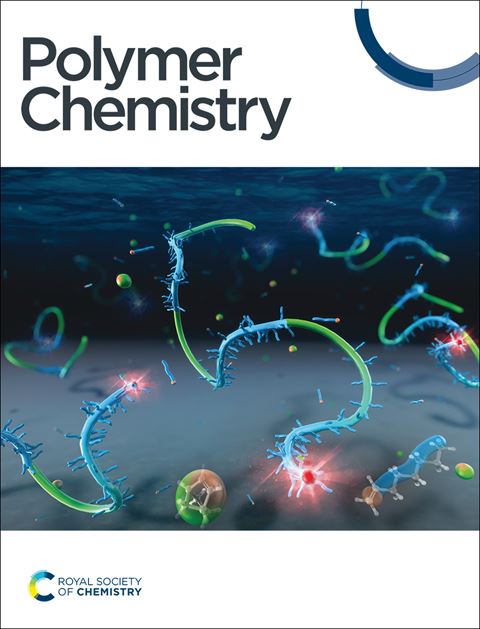从植物油中提取的疏水性丙烯酰胺单体的合成和 RAFT 聚合反应
IF 4.1
2区 化学
Q2 POLYMER SCIENCE
引用次数: 0
摘要
以脂肪酸 (FA) 为基础的聚合物材料具有多种特性(烯基、疏水性、可调 Tg),因此极有可能成为可再生的高价值材料。在此,我们研究了四种不同植物油(高油酸葵花籽油、橄榄油、氢化椰子油和氢化菜籽油)与 N-羟乙基丙烯酰胺的碱催化酯交换反应。通过进行动力学实验、调查潜在的副反应和改进目标产物的分离,我们能够识别出残留在不纯盐水洗植物油基单体(POBM)中的反应性杂质(自由基抑制剂、非预期的共聚单体)。然后进行了动力学实验,研究这些单体的 RAFT 聚合反应。实验发现,对于 kp app 较高的单体(饱和)的受控自由基聚合而言,更具可持续性的盐水洗涤工艺是可行的,但要对不饱和单体进行良好控制,则必须进行柱净化。合成的聚合物 Mn 值介于 3,000 和 12,000 gmol-1 之间,并根据 FA 源的不同表现出无定形或半结晶特性(Tg 值介于 -1 和 33 °C,Tm 值介于 48 和 66 °C)。这项研究首次展示了通过一步直接酯交换反应对从植物油中提取的丙烯酰胺单体进行 RAFT 聚合的实例,从而为开发定义明确的新型功能性生物基聚合物打开了大门。本文章由计算机程序翻译,如有差异,请以英文原文为准。
Synthesis and RAFT polymerisation of hydrophobic acrylamide monomers derived from plant oils
Polymeric materials based on fatty acids (FAs) have a combination of characteristics (alkene groups, hydrophobicity, tuneable Tg) that give them great potential as renewable, high value materials. Here, we investigate the base catalysed transesterification of four different plant oils (high oleic sunflower, olive, hydrogenated coconut and hydrogenated rapeseed) with N-hydroxyethyl acrylamide. By conducting kinetics experiments, investigating potential side reactions and improving isolation of the target products, we were able to identify reactive impurities (radical inhibitors, unintended co-monomers) that were found to remain in the impure brine washed plant oil-based monomers (POBM). Kinetics experiments were then performed to investigate the RAFT polymerisation of these monomers. It was found that the more sustainable brine washing process was viable for the controlled radical polymerisation of the higher kp app (saturated) monomers, however column purification was necessary for good control of unsaturated monomers. Polymers with values of Mn between 3,000 and 12,000 gmol-1 were synthesised and dependent on the FA source exhibited either amorphous or semi-crystalline behaviour (Tg values between -1 and 33 °C, Tm values between 48 and 66 °C). This work demonstrates the first example of RAFT polymerisation of acrylamide monomers derived from plant oils by a one step direct transesterifcation, opening the door for novel well-defined, functional bio-based polymers.
求助全文
通过发布文献求助,成功后即可免费获取论文全文。
去求助
来源期刊

Polymer Chemistry
POLYMER SCIENCE-
CiteScore
8.60
自引率
8.70%
发文量
535
审稿时长
1.7 months
期刊介绍:
Polymer Chemistry welcomes submissions in all areas of polymer science that have a strong focus on macromolecular chemistry. Manuscripts may cover a broad range of fields, yet no direct application focus is required.
 求助内容:
求助内容: 应助结果提醒方式:
应助结果提醒方式:


